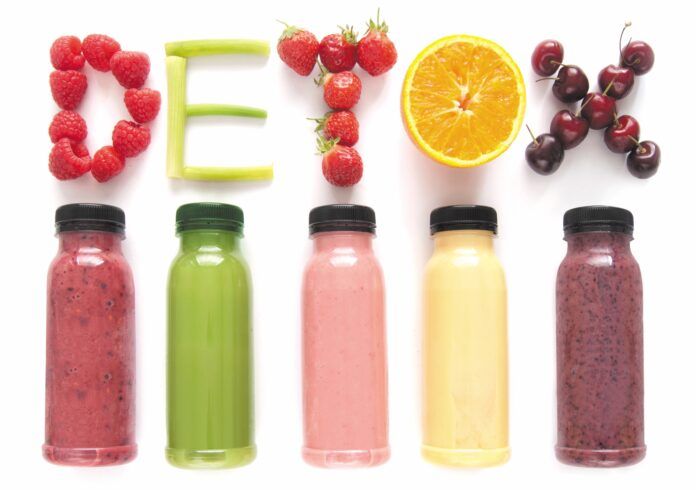Juice cleanses involve consuming nothing but fruit and vegetable juices, often organic and raw, for two to 10 days. If you are considering trying one of these programs, be sure to be informed before you start.
The Claims. Proponents say juice cleanses help detoxify your body and jumpstart weight loss, among other claims. Let’s take a look at the facts:
- Weight Loss. A scientific review of research on juice cleanses and other “detox” diets found they can lead to initial weight loss—but users tend to regain the weight soon after they resume eating normally. “Very low calories diets like juice cleanses can send the body into ‘starvation mode,’” cautions Kayli Anderson, MS, RDN, a registered dietitian nutritionist and lead faculty of the American College of Lifestyle Medicine Food as Medicine course. “This is a natural process whereby the body slows its metabolism to maximize every calorie in the event of food shortage. A slower metabolism discourages longer-term weight loss.”
- Detoxification. We are exposed to low levels of potential toxins every day. Some are external: things we eat, drink, breath, and absorb through the skin—such as food additives, alcohol, tobacco, and chemicals from plastics, household cleaning products, pharmaceuticals, and beauty and skin care products. Some are internal, including waste products of normal metabolism, like lactic acid and urea, and some output of gut microbes.
Our bodies have extensive systems to naturally remove these toxins. “Currently, there is no good evidence that any commercial detox diets, including juice cleanses, actually help the body remove toxins,” says Anderson.
Safety. Short term, very low-calorie diets like most juice cleanses can lead to side effects that include headaches, fainting, weakness, fatigue, and irritability. While long-term effects have not been studied, following a highly limited diet for long periods of time has the potential to lead to nutrient deficiencies.
Many juices recommended for cleanses are unpasteurized. “Raw juices can harbor dangerous bacteria,” cautions Anderson. “Any bacteria on the surface of the produce or the machines becomes part of juice. Pasteurization kills bacteria, but raw juices are not pasteurized. Healthy people can fight off small exposures to these bacteria, but exposure to a high quantity can lead to illness.” The U.S. Food and Drug Administration recommends immunocompromised individuals, older adults, infants, young children, and pregnant or lactating woman avoid consuming raw juices.
“Importantly, highly restrictive diets do not get to the root of the problem,” says Alice H. Lichtenstein, DSc, a professor at the Friedman School and executive editor of Tufts Health & Nutrition Letter. “They do not teach us how to make healthier food choices or change our behaviors around food intake.” Anderson agrees. “Any kind of extreme diet perpetuates an unhealthy relationship with food,” she says, “creating a relationship of guilt, restriction, and control under the guise of purifying and caring for oneself.”
What to Do. “Our body has its own natural detoxification system,” says Anderson. “It works around the clock to eliminate toxins through our urine, feces, respiration, and sweat.” Staying hydrated (with mostly water, plus other unsweetened beverages), keeping the digestive tract moving with plenty of fiber, and working up a sweat through physical activity all help with toxin elimination, and a healthy dietary pattern is important as well.
“Many nutrients in foods support the body’s natural detox systems,” Anderson explains, so consuming a healthy dietary pattern is the best way to support detoxification.” While the fruits and vegetables used to make juices provide many bioactive compounds important to health, fiber and some nutrients are lost in the juicing process, so Anderson and other experts recommend choosing whole fruits and vegetables over juices, along with other foods high in fiber and other bioactive compounds, like minimally processed whole grains, nuts/seeds, and legumes.
“Supporting the body’s detoxification is really about sustaining a healthy lifestyle,” says Anderson.
Trust Your Body. The body has a natural toxin-removal system. Cleanses and detoxes that claim to improve health have not been demonstrated to be effective, or to support lasting weight loss.
Support Natural Toxin Removal. Regular physical activity and a dietary pattern that includes plenty of water, fiber, and nutrient-rich minimally processed plant foods (instead of sugary drinks and highly processed foods) support the natural removal of toxins via urine, feces, sweat, and respiration.
























